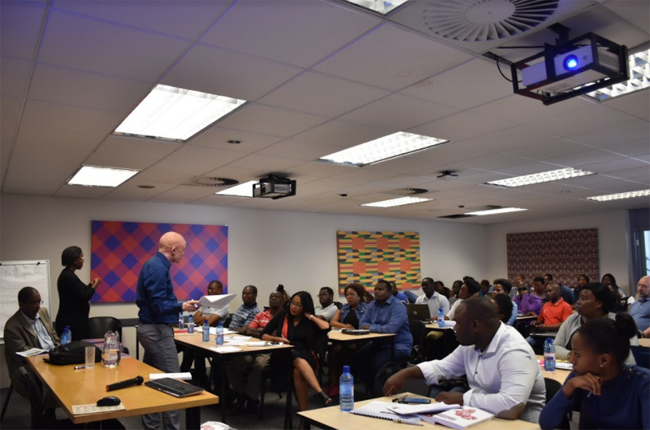The Centre for Human Rights, University of Pretoria held a one-week intensive short course on Disability Rights in the African context from 12 to 16 March 2018. The course is part of a series of Advanced Human Rights Short Courses the Centre organises and offers to the members of the public. Over 60 participants from over 20 African countries enrolled and attended this year’s course. The participants included: persons with disabilities working in human rights, LLM/MPhil human rights students, Doctoral candidates working on disability rights, human rights activists, government officials, police officers, policy makers and distinguished Professors.
Guests speakers and presenters included, but were not limited to: Commissioner Lawrence Mute, Professor Charles Ngwena- the convenor of the course - Prof Michael Stein of the Harvard Law School Project on Disability, Professor Dinerstein, Professor Helene Combrinck and Josephat Torner, leading human rights activist for persons with albinism.
In his opening remarks, Professor Charles Ngwena urged the participants to consider localising the language of human rights as an enabling tool to make changes in communities. The course first discussions were focused on the UN Convention on the Rights of Persons with Disabilities (CRPD), the Protocol to the African Charter on the Rights of Persons with Disabilities, key challenges persons with disabilities encounter in education and lastly the challenges Disabled Peoples Organizations deal with across Sub-Saharan Africa. Furthermore, participants engaged in questions on how persons with psychosocial and intellectual disabilities can realize their right to independent living; what reasonable accommodation is and the need for it to enable persons with disabilities to access justice. And, Prof Robert Dinerstein anchored an interesting discussion on legal capacity and supported decision making as contained in Article 12 of the CRPD.
The key highlights of the course were the personal narratives by persons living with psychosocial disabilities, persons with sensory impairments and persons with albinism. These narratives gave breath to the theories participant learned through the week. The screening of the documentary In the Shadow of the Sun on albinism gave participants an understanding of the violence perpetrated towards persons with albinism. The protagonist of the aforesaid documentary Mr Josephat Torner was present and led a discussion on the key issues that rose from the documentary. In the discussion, Mr Torner asked participants to consider how they can engage with their communities to address the misconceptions regarding persons with albinism. Mr Tornet went further and urged participants to interrogate their own biases, so as to better position themselves as instrument of change upon their return to their respective communities.
On the last day of the course, the participants were given a platform and opportunity to reflect, express and share the knowledge gained and how they will practically use the knowledge to advocate for the rights of persons with disabilities in their communities. The participants also expressed their gratitude for the network built during the training, as they saw the network and new partnerships formed as a key uniting and unifying mechanism wherein a Pan-African movement can emerge that will address and push for the promotion and protection of the rights of persons with disabilities.


